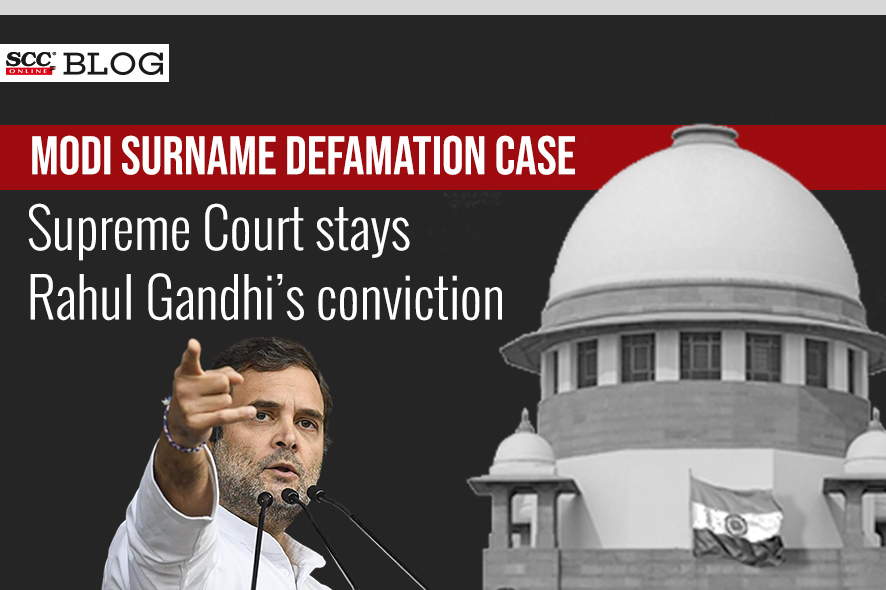Supreme Court: The Three Judge Bench comprising of B.R. Gavai, PS Narasimha and Sanjay Kumar, JJ., while hearing an appeal against Gujarat High Court’s order wherein, Rahul Gandhi’s/ appellant’s revision petition challenging the Session Court’s order thereby rejecting the prayer to stay his conviction was dismissed, said that considering that there are wide ramifications of the conviction order and Section 8(3) of the Representation of the People Act, 1950 (‘Act’) and they not only affect the right of the appellant to continue in public life but also affect the right of the electorate, who elected him, to represent their constituency. and that no reason was given by the Trial Court for imposing the maximum sentence, therefore, the conviction order needs to be stayed.
Background
A private complaint was filed against Rahul Gandhi, wherein it was alleged that he gave a speech at Kolar Near Bengaluru and addressed the Prime Minister as a thief and compared him with several economic offenders of India like Nirav Modi, Mehul Choksi, Lalit Modi and Vijay Malya. It was also alleged that Gandhi had asked that,” why all thieves have the surname Modi” and defamed the
Prime Minister by saying that in Rafale deal the Prime Minister is 100 percent thief and not chowkidar. The Chief Judicial Magistrate (‘CJM’) had found Rahul Gandhi guilty of the offence punishable under Sections 499 and 500 of the Penal Code, 1860 (‘IPC’) and sentenced him to undergo simple imprisonment of two years. Being aggrieved with the said order of the CJM, he had preferred an appeal before the District and Sessions Court, Surat. However, the said appeal was dismissed vide order dated 20-04-2023. Subsequently, Gandhi had preferred a revision petition before the High Court, challenging the Session Court’s order.The Gujarat High Court said that there was no reasonable ground to stay Rahul Gandhi’s conviction and dismissed the criminal revision petition, thus forming the impugned judgment. Hence, the present appeal.
Order
The Court noted that an appeal against the conviction order and sentence passed by the Trial Court is pending before the Appellate Court, therefore, the Court refrained from touching the merits of the matter.
Regarding the stay on conviction order, the Court noted that for an offence punishable under Section 499 of the IPC the maximum sentence is simple imprisonment for two years or fine or both and the Trial Court had awarded the maximum sentence of imprisonment for two years to the appellant. The Court said that, except a reason that admonition was given to the appellant by the Court in Yashwant Sinha and Others v. Central Bureau of Investigation, (2020) 2 SCC 338, no other reason was assigned by the Trial Judge while imposing the maximum sentence of two years. Further, the Court said that it is only on account of the maximum sentence of two years imposed by the Trial Court, the provisions of Section 8(3) of the Act were attracted. The Court stated that had the sentence been even a day lesser, the provisions of Section 8(3) of the Act would not have been attracted.
Additionally, the Court explained that particularly when an offence is non-cognizable, bailable and compoundable, the least that the Trial Court was expected to do was to give some reasons as to why, in the facts and circumstances, it was found necessary to impose the maximum sentence of two years. The Court said that a person in public life is expected to exercise a degree of restraint while making public speeches and no doubt the alleged utterances by the appellant were not in good state, however, had the judgment in Yashwant Sinha (supra) came prior to the speech made by the appellant, he would have been more careful and exercised a degree of restraint while making the alleged remarks, which the Trial Court had found defamatory.
Therefore, the Court was of the considered view that the ramifications of Section 8(3) of the Act are wide-ranging, and they not only affect the right of the appellant to continue in public life but also affect the right of the electorate, who have elected him, to represent their constituency. Thus, the Court said that considering that the Trial Court gave no reason for imposing the maximum sentence which had the effect of disqualifying the appellant under Section 8(3) of the Act, the conviction order was stayed. Further, the Court clarified that the pendency of the present appeal would not come in the way of the Appellate Court in deciding the appeal and it would be decided on its own merits, in accordance with law.
[Rahul Gandhi v. Purnesh Ishwarbhai Modi, 2023 SCC OnLine SC 929, Order Dated: 04-08-2023]
Advocates who appeared in this case:
For the appellant: Senior Advocate Abhishek Manu Singhvi, Senior Advocate R.S. Cheema, Senior Advocate Harin. P. Raval, Senior Advocate Prashanto Chandra Sen, AOR Prasanna S., Advocate Tarannum Cheema, Advocate Kanishka Singh, Advocate Nikhil Bhalla, Advocate Amit Bhandari, Advocate Avishkar Singhvi, Advocate Siddharth Seem, Advocate Raghav Kacker, Advocate Sumit Kumar, Advocate Swati Arya, Advocate Yuvraj Singh Rathore;
For the respondents: Solicitor General Tushar Mehta, AOR Deepanwita Priyanka, Senior Advocate Mahesh Jethmalani, Advocate Harshit S Tolia, AOR P. S. Sudheer, Advocate Rishi Maheshwari, Advocate Bharat Sood, Advocate Jeet Rajyaguru, Advocate Biren Panchal, Advocate Riya Dani, Advocate Miranda Soloman, Advocate Mughda Pande, Advocate Ravi Sharma, Advocate Ajay Awasthi, Advocate Wedo Khalo, Advocate Sitesh Narayan Singh.








